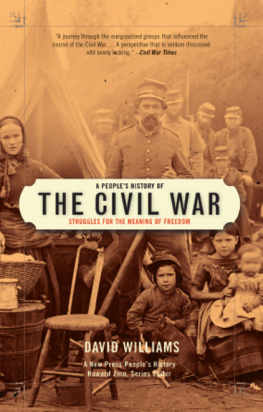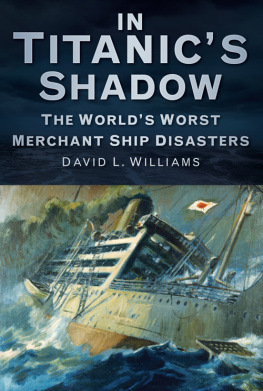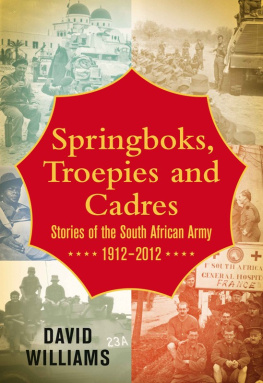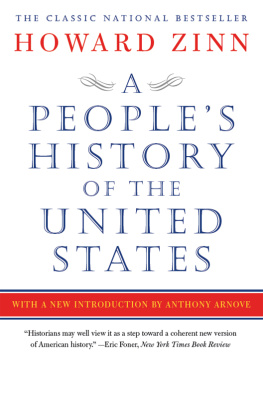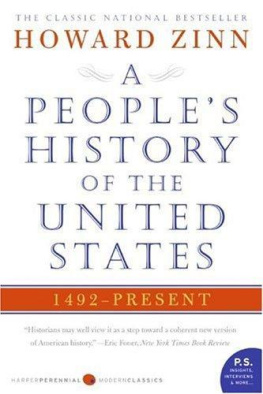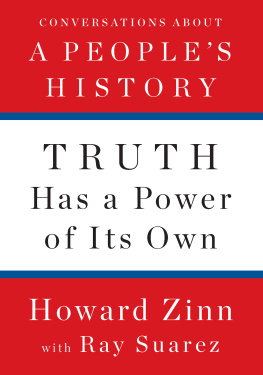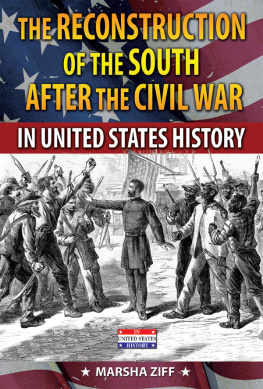A PEOPLES HISTORY OF THE CIVIL WAR
ALSO BY DAVID WILLIAMS
Plain Folk in a Rich Mans War: Class and Dissent in Confederate Georgia (with Teresa Crisp Williams and David Carlson)
Johnny Rebs War: Battlefield and Homefront
Rich Mans War: Class, Caste, and Confederate Defeat in the Lower Chattahoochee Valley
The Georgia Gold Rush: Twenty-niners, Cherokees, and Gold Fever
Gold Fever: Americas First Gold Rush
(with Ray C. Rensi)
A PEOPLES HISTORY
OF THE CIVIL WAR
STRUGGLES FOR THE MEANING
OF FREEDOM
DAVID WILLIAMS

NEW YORK
LONDON
2005 by David Williams
All rights reserved.
No part of this book may be reproduced, in any form, without written permission from the publisher.
Requests for permission to reproduce selections from this book should be mailed to:
Permissions Department, The New Press, 38 Greene Street, New York, NY 10013
First paperback edition published in the United States by The New Press, New York, 2006
Distributed by W. W. Norton & Company, Inc., New York
LIBRARY OF CONGRESS CATA LOGING-IN-PUBLICATION DATA
Williams, David, 1959
A peoples history of the Civil War : struggles for the meaning of freedom / David Williams.
p. cm. (A New Press peoples history)
Includes bibliographical references (p. ).
ISBN: 978-1-59558-747-3
1. United StatesHistoryCivil War, 18611865Social aspects. 2. United StatesHistoryCivil War, 18611865. I. Title. II. Series.
E468.9.W56 2005
The New Press was established in 1990 as a not-for-profit alternative to the large, commercial publishing houses currently dominating the book publishing industry. The New Press operates in the public interest rather than for private gain, and is committed to publishing, in innovative ways, works of educational, cultural, and community value that are often deemed insufficiently profitable.
www.thenewpress.com
Composition by Westchester Book Composition
2 4 6 8 10 9 7 5 3 1
For Trish
Contents
Turning history on its head opens up whole new worlds of possibility. Once, historians looked only at societys upper crust: the leaders and others who made the headlines and whose words and deeds survived as historical truth. In our lifetimes, this has begun to change. Shifting historys lens from the upper rungs to the lower, we are learning more than ever about the masses of people who did the work that made society tick.
Not surprisingly, as the lens shifts the basic narratives change as well. The history of men and women of all classes, colors, and cultures reveals an astonishing degree of struggle and independent political action. Everyday people played complicated historical roles, and they developed highly sophisticated and often very different political ideas from the people who ruled them. Sometimes their accomplishments left tangible traces; other times, the traces are invisible but no less real. They left their mark on our institutions, our folkways and language, on our political habits and vocabulary. We are only now beginning to excavate this multifaceted history.
The New Press Peoples History Series roams far and wide through human history, revisiting old stories in new ways, and introducing altogether new accounts of the struggles of common people to make their own history. Taking the lives and viewpoints of common people as its point of departure, the series reexamines subjects as different as the American Revolution, the history of sports, the history of American art, the Mexican Revolution, and the rise of the Third World.
A peoples history does more than add to the catalogue of what we already know. These books will shake up readers understanding of the pastjust as common people throughout history have shaken up their always changeable worlds.
Howard Zinn
Boston, 2000
Foremost among the many debts I owe in the making of this book is to Howard Zinn for encouraging me throughout the project and for his long years of dedication to the practice of peoples history. I first read his Peoples History of the United States many years ago as a graduate student, and his point of view has inspired my work ever since. I hardly owe less of a debt to the many fine scholars upon whose work this book is based. The inquisitive perseverance and diligent research reflected in their works have made mine possible. For help with tracking down those works and making good use of them, I am indebted to Alan Bernstein, Denise Montgomery, and Rex DeVane of Valdosta State Universitys Odum Library.
Marc Favreau, senior editor at The New Press, deserves much appreciation for his suggestions on improving the manuscript and for shepherding it through the publishing works. Sarah Fan, my production editor, and David Allen, my copy editor, deserve much appreciation as well for their hard work in carrying the manuscript through its final paces toward print.
Though a small contribution to the literature of my field, this work is quite likely to be my magnum opus. So, on this occasion, I feel compelled, as I often do but fail in the follow-through, to say how grateful I am to those who contributed so much to the making of me and my career. First to my parents, Harold O. Williams and Anita D. Williams, children of poverty and depression who made sure that their children knew the value of education. And to my younger brother, Scott, who often served more as an example to me than I did to him.
To my wife, Teresa Crisp Williams, I shall always be grateful for her many years of steadfast patience and loving encouragement. Her faith in me has been the foundation on which my efforts have been largely built. I am eternally grateful to her family as well for their patience, tolerance, and help with more moves than I care to remember.
I owe many thanks to a few professors from my undergraduate days at North Georgia College for their inspiration, insights, and personal efforts for me: John Csomor, who taught me that true patriotism is never blind; Frank Smith, who showed me that there are at least half-a-dozen reasons for everything; Brian Murphy, who gave me a broader view of what democracy should mean; and Ray Rensi, who showed me what I could be as a teacher.
I am especially grateful to my professors during my doctoral days at Auburn University for their exemplary lessons in what it is to be a scholar. Especially influential were Guy Beckwith, Donna Bohanan, Thomas Belser, John Cottier, Allen Cronenberg, Wayne Flynt, Larry Gerber, James Hansen, Joseph Harrison, Joe Kicklighter, David Lewis, Michael Melancon, Steve McFarland, and Bill Trimble. A special thanks goes to my dissertation adviser, Frank Lawrence Owsley Jr., who never kept the reins too tight.
I am grateful also to friends and fellow students along the way. Among those whose concern, companionship, and memories remain most treasured are Bob Patterson, Lisa Stepancic, Kay Ray, Tom Amsler, Joy Hartsfield, B.J. House, Beth McNeil, Kathy Yarbrough, Connie Dunbar, Renee Bruce, Debbie Brannon, Mark McDonough, Brian Phelps, Gene Smith, Jim Segrest, Bill Bryant, Johnny Dollar, Susan Dollar, Martha Viator, Karen Beckwith, Jack Bergstresser, Sandra Bergstresser, Mickey Crews, Hal Parker, Church Murdock, Kim Cantrell, Mary Lee Carter, Alice Pate, Lynne Rieff, Burt Rieff, Dottye Ricks, and Richard Porter.
Any number of fellow scholars have been supportive of my work over the years, read and commented on earlier manuscripts, or otherwise helped my career along the way. Among those who deserve special mention for their support are David Carlson, Lee Formwalt, John Inscoe, William Freehling, Wayne Durrill, Anne Bailey, Anastatia Sims, Mike Fitzgerald, Junius Rodriguez, Billy Winn, Victoria Bynum, Jeff Jakeman, David Heidler, Jeanne Heidler, Emory Thomas, Nash Boney, Edmund Drago, Stanley Harrold, and Randall Miller.

